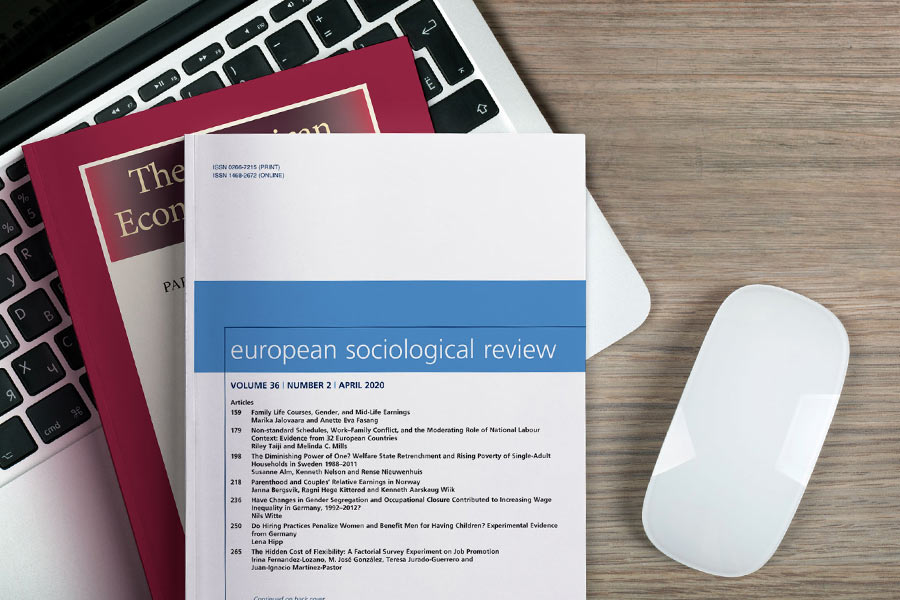Total hits 17.202
-
Effectiveness of One-Euro-Jobs: Do programme characteristics matter?
Hohmeyer, K. (2009): Effectiveness of One-Euro-Jobs: Do programme characteristics matter? (IAB-Discussion Paper 20/2009), Nürnberg, 60 p.
-
Zeitarbeit in Sachsen-Anhalt
Fuchs, M. (2009): Zeitarbeit in Sachsen-Anhalt. Aktuelle Entwicklungstendenzen und Strukturen. (IAB-Regional. Berichte und Analysen aus dem Regionalen Forschungsnetz. IAB Sachsen-Anhalt-Thüringen 04/2009), Nürnberg, 47 p.
-
The world of work is getting older: what labour and legal social regulations are recommendable to adjust the legal status and improve the employment chances of older employees?
Walwei, U. (2009): Alternde Arbeitswelt: Welche arbeits- und sozialrechtlichen Regelungen empfehlen sich zur Anpassung der Rechtsstellung und zur Verbesserung der Beschäftigungschancen älterer Arbeitnehmer? In: Ständige Deputation des Deutschen Juristentages (Hrsg.) (2009): Verhandlungen des Siebenundsechzigsten Deutschen Juristentages : Erfurt 2008. Bd. II/1: Sitzungsberichte - Referate und Beschlüsse, p. K 79-K 105.
-
Theoretical overview
Vinkenburg, C., Clem, H., Lewis, S. & Fuchs, S. (2009): Theoretical overview. In: Europäische Komission (Hrsg.) (2009): Women in science and technology : creating sustainable careers, p. 84-89.
-
Labour market effects of European integration in the Bavarian and Czech border regions
Moritz, M. (2009): Labour market effects of European integration in the Bavarian and Czech border regions. (IAB-Bibliothek 321), Bielefeld: Bertelsmann, 165 p. DOI:10.3278/300682w
-
Arbeitsmarktwirkungen der Migration
Brücker, H. (2009): Arbeitsmarktwirkungen der Migration. In: Aus Politik und Zeitgeschichte No. 44, p. 6-12.
-
EU eastern enlargement: Benefits from labour migration
Baas, T., Brücker, H. & Hauptmann, A. (2009): EU-Osterweiterung: Positive Effekte durch Arbeitsmigration. (IAB-Kurzbericht 09/2009), Nürnberg, 8 p.
-
Have labour market reforms at the turn of the millennium changed job durations of the new entrants?
Giannelli, G., Jaenichen, U. & Villosio, C. (2009): Have labour market reforms at the turn of the millennium changed job durations of the new entrants? A comparative study for Germany and Italy. (LABORatorio Riccardo Revelli working paper 95), Turin, 38 p.
-
Das Einpassen in den Ort
Meier, L. (2009): Das Einpassen in den Ort. Der Alltag deutscher Finanzmanager in London und Singapur. (Materialitäten 11), Bielefeld: Transcript Verlag, 300 p.
-
Do smart parents raise smart children?
Anger, S. & Heineck, G. (2009): Do smart parents raise smart children? The intergenerational transmission of cognitive abilities. (SOEPpapers on multidisciplinary panel data research at DIW Berlin 156), Berlin, 37 p.
-
Assessing the distributional effects of German labour market reforms on former recipients of unemployment assistance : an empirical analysis using survey data
Bruckmeier, K. & Schnitzlein, D. (2009): Der Übergang von Arbeitslosenhilfeempfängern in das SGB II. Eine empirische Analyse anhand von Befragungsdaten. In: Sozialer Fortschritt, Vol. 58, No. 1, p. 1-9. DOI:10.3790/sfo.58.1.1
-
Returns to human capital in Germany post-unification
Lupo, K. & Anger, S. (2009): Returns to human capital in Germany post-unification. In: C. Wey & K. F. Zimmermann (Hrsg.) (2009): Twenty years of economic reconstruction in East Germany (Applied economics quarterly supplement, 60), p. 83-110.
-
A Regional Perspective on Social Security and Federal Spatial Funding : Who Participates How?
Bruckmeier, K., Zarth, M. & Schnitzlein, D. (2009): Eine regionale Betrachtung der Sozialversicherung und raumwirksamer Bundesmittel. Wer partizipiert wie? In: H. Mäding (Hrsg.) (2009): Öffentliche Finanzströme und räumliche Entwicklung (Akademie für Raumforschung und Landesplanung. Forschungs- und Sitzungsberichte, 232), p. 105-133.
-
Neural networks for cross-sectional employment forecasts
Patuelli, R., Reggiani, A., Nijkamp, P. & Schanne, N. (2009): Neural networks for cross-sectional employment forecasts. A comparison of model specifications for Germany. (Quaderno 09-03), Lugano, 20 p.
-
The extent of collective bargaining and workplace representation: transitions between states and their determinants
Addison, J., Bryson, A., Teixeira, P., Pahnke, A. & Bellmann, L. (2009): The extent of collective bargaining and workplace representation: transitions between states and their determinants. A comparative analysis of Germany and Great Britain. (CEP discussion paper 954), London, 62 p.
-
Employer wage subsidies and wages in Germany
Stephan, G. (2009): Employer wage subsidies and wages in Germany. Some evidence from individual data. (IAB-Discussion Paper 09/2009), Nürnberg, 34 p.
-
Exploring Terra Incognita: Operating Hours in the Service Sector
Bauer, F. & Groß, H. (2009): Exploring terra incognita: operating hours in the service sector. In: L. Delsen, F. Bauer, G. Cette & M. Smith (Hrsg.) (2009): Comparative analyses of operating hours and working times in the European Union, p. 83-115. DOI:10.1007/978-3-7908-2185-7_4
-
Further Increasing Mobility of Employees in Brandenburg : Findings of the IAB Commuter Analysis 2008 on Labour Mobility of Men and Women
Wiethölter, D. & Wesling, M. (2009): Mobilität der Brandenburger Beschäftigten nimmt weiter zu. Ergebnisse der IAB-Pendleranalyse 2008 zur Arbeitsmobilität von Männern und Frauen. In: Brandaktuell No. 1, p. 12-13.
-
The creative class, bohemians and local labor market performance
Möller, J. & Tubadji, A. (2009): The creative class, bohemians and local labor market performance. A micro-data panel study for Germany 1975-2004. In: Jahrbücher für Nationalökonomie und Statistik, Vol. 229, No. 2/3, p. 270-291. DOI:10.1515/jbnst-2009-2-312
-
Synthetic datasets for the German IAB Establishment Panel
Drechsler, J. (2009): Synthetic datasets for the German IAB Establishment Panel. (Joint UNECE/Eurostat Work Session on Statistical Data Confidentiality 2009. Working paper 10), New York, 13 p.



